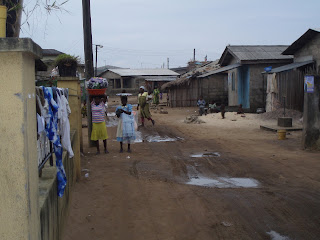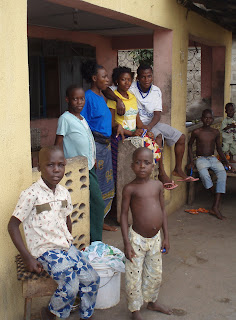
We entered the village through walking through the gat es along the main road.
es along the main road.
We brought gifts for the chief, the Oba, of a bottle of schnapps, a pineapple, some sweets and some kola nuts, the traditional welcome gift of the area.
 es along the main road.
es along the main road.We brought gifts for the chief, the Oba, of a bottle of schnapps, a pineapple, some sweets and some kola nuts, the traditional welcome gift of the area.

Here's the Oba in a meeting room with some of the village elders. Although he spoke English, the young Yoruba-speaking Nigerian woman who went with us knelt before him and explained who we were and why we were visiting their village.
One of the main reasons for choosing to stop at this village was because of this grave m onument marking the death of Georg Schlaikier, a young man who died here in 1879 at the age of 25. His family owned a brick and tile factory in what was then Germany (now Denmark) and he was likely traveling with one of their ships to trade bricks and tiles. It is assumed that he took sick and died and, because of his family prestige, was not consigned to the sea but buried in the village. Later, another ship brought out the headstone which bears his dates of birth and death, a scripture and the touching inscription: "An homage to the unforgettable Son from his Mother." Our historian/guide said it is a magical grave marker because it seems to travel to a different place every time he comes to the village. The locals said that they keep moving it to protect it -- they value it and don't want anyone to steal it away. Saturday it was just lying on its side in the sand, but the historical association is hoping to make a more permanent monument with some background information.
onument marking the death of Georg Schlaikier, a young man who died here in 1879 at the age of 25. His family owned a brick and tile factory in what was then Germany (now Denmark) and he was likely traveling with one of their ships to trade bricks and tiles. It is assumed that he took sick and died and, because of his family prestige, was not consigned to the sea but buried in the village. Later, another ship brought out the headstone which bears his dates of birth and death, a scripture and the touching inscription: "An homage to the unforgettable Son from his Mother." Our historian/guide said it is a magical grave marker because it seems to travel to a different place every time he comes to the village. The locals said that they keep moving it to protect it -- they value it and don't want anyone to steal it away. Saturday it was just lying on its side in the sand, but the historical association is hoping to make a more permanent monument with some background information.
 onument marking the death of Georg Schlaikier, a young man who died here in 1879 at the age of 25. His family owned a brick and tile factory in what was then Germany (now Denmark) and he was likely traveling with one of their ships to trade bricks and tiles. It is assumed that he took sick and died and, because of his family prestige, was not consigned to the sea but buried in the village. Later, another ship brought out the headstone which bears his dates of birth and death, a scripture and the touching inscription: "An homage to the unforgettable Son from his Mother." Our historian/guide said it is a magical grave marker because it seems to travel to a different place every time he comes to the village. The locals said that they keep moving it to protect it -- they value it and don't want anyone to steal it away. Saturday it was just lying on its side in the sand, but the historical association is hoping to make a more permanent monument with some background information.
onument marking the death of Georg Schlaikier, a young man who died here in 1879 at the age of 25. His family owned a brick and tile factory in what was then Germany (now Denmark) and he was likely traveling with one of their ships to trade bricks and tiles. It is assumed that he took sick and died and, because of his family prestige, was not consigned to the sea but buried in the village. Later, another ship brought out the headstone which bears his dates of birth and death, a scripture and the touching inscription: "An homage to the unforgettable Son from his Mother." Our historian/guide said it is a magical grave marker because it seems to travel to a different place every time he comes to the village. The locals said that they keep moving it to protect it -- they value it and don't want anyone to steal it away. Saturday it was just lying on its side in the sand, but the historical association is hoping to make a more permanent monument with some background information. More interesting than the gravestone was the village and the local people. Our group attracted quite a following of children. All the locals seemed to really enjoy having their pictures taken -- the children frequently begged for it and loved to pose. They collapsed in giggles when shown their digital image on the back of the camera.
More interesting than the gravestone was the village and the local people. Our group attracted quite a following of children. All the locals seemed to really enjoy having their pictures taken -- the children frequently begged for it and loved to pose. They collapsed in giggles when shown their digital image on the back of the camera.
These children are gathering around the member of our group who took their picture so they can see the picture on the back of the camera.
Georg's gravestone was not the only one in the village. We thought it was interesting that there were graves all over the village, usually right beside the houses.






This village is beside the beach, facing the part of the Atlantic Ocean called the Bight of Benin. It's on the Lekki Peninsula, which stretches about 40 kilometeres to the east of Lagos Island and is a low lying area that separates Lagos lagoon from the sea. The fishing boats were lined up on the beach, indicating that fishing is a major industry.


Wherever you go in Nigeria, there are children and adults carrying their load on top of their heads.









Wherever you go in Nigeria, there are children and adults carrying their load on top of their heads.







I really enjoyed seeing the friendly faces of these children in Orimedu. Though some were naked or wore just underwear, and they were living in conditions that we in the US would call poverty and deprivation, they seemed happy and content.


























1 comment:
Fascinating about the headstone!
I think Georg may be my second cousin thrice removed. I have his dates as 1862-1879, and his middle name as Adolf, no offspring. Your birth date of 1853/4 might be reasonable. That would make him the oldest of his siblings, followed by Marie (1855).
I cannot quite make out the text on the stone. Can you transcribe it or email a picture with better contrast?
Thanks, and have fun in Lagos!
Erich Schlaikjer
(my email is 'firstname'@'lastname'.net, replacing the words in 's).
Post a Comment